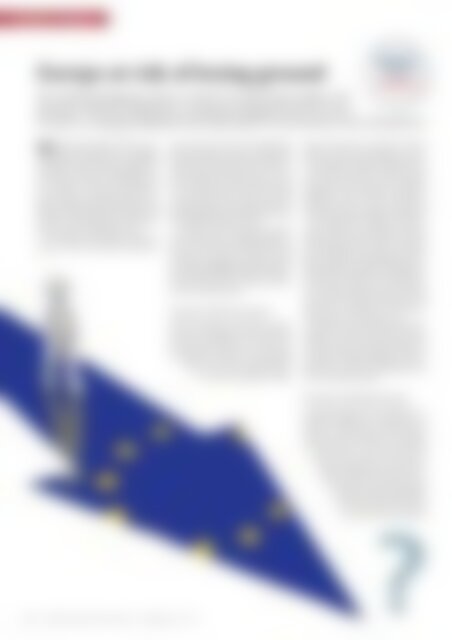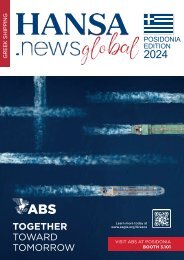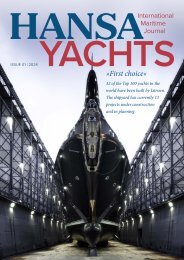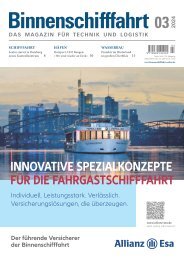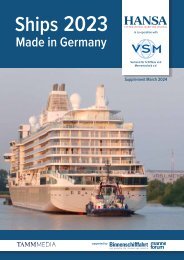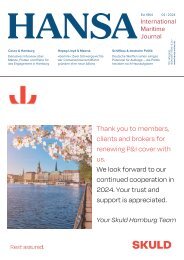HANSA 05-2017
Special Focus: NorShipping 2017 | HullPic Review | COMPIT Preview | Leonhardt & Blumberg | Sewol salvage | Tugs | German Banks | Tanker | Maritime Politics | Offshore Tender
Special Focus: NorShipping 2017 | HullPic Review | COMPIT Preview | Leonhardt & Blumberg | Sewol salvage | Tugs | German Banks | Tanker | Maritime Politics | Offshore Tender
Create successful ePaper yourself
Turn your PDF publications into a flip-book with our unique Google optimized e-Paper software.
Schifffahrt | Shipping<br />
Europe at risk of losing ground<br />
INTERNATIONAL MARITIME JOURNAL<br />
FORUM<br />
SCHIFFFAHRT<br />
FINANZIERUNG<br />
The traditional shipping centres in in the EU are still a heavyweight in the<br />
maritime world, but competition is catching up. Regulators have to review<br />
EU policy as emerging shipping hot spots gain appeal for international owners and operators<br />
While in general the EU offers a competitive<br />
framework for shipping,<br />
some specific policies are less competitive<br />
compared to other leading shipping centres.<br />
Monitor Deloitte, commissioned by<br />
the European Community Shipowners’<br />
Association, has compared the EU to Singapore,<br />
Hong Kong, Dubai, Shanghai, and<br />
Vancouver. The analysts have devised a set<br />
of policy recommendations on how to improve<br />
Europe as a shipping location.<br />
In November 2016, EU28 and Norway<br />
owned 36.5% of the gross world tonnage,<br />
whereas 46.2% were operated from<br />
the same countries. However, compared to<br />
the international growth centres, the EU is<br />
experiencing a slower growth in terms of<br />
the tonnage operated and owned. In recent<br />
years, the EU has just been able to keep up<br />
an annual growth rate equal to the world<br />
average, while the most important international<br />
shipping centres outside the EU have<br />
had strong annual growth rates.<br />
To what extent do European policies<br />
support the long-term global competitiveness<br />
or are they in fact contributing to the<br />
relocation of companies activities as well<br />
as further de-flagging outside Europe? Monitor<br />
Deloitte found a number of important<br />
gaps where the EU offers less attractive<br />
or consistent policies.<br />
Taxation and fiscal incentives<br />
The ease of relocation of activities in combination<br />
with the aggressive fiscal incentives<br />
that other international centres offer suggest<br />
that effective taxation is a »sine qua non<br />
condition« to maintain a sizeable market<br />
share. The current regime facilitated<br />
by the Community Guidelines<br />
on State aid to maritime transport<br />
(2004/C 13/03, SAGs) provides for a relatively<br />
competitive European shipping sector.<br />
But Monitor Deloitte’s analysis reveals<br />
that the EU framework is less competitive<br />
with regard to several elements, including<br />
eligibility criteria relating to the flag requirement<br />
and the current ring-fencing<br />
put in place by the European Commission.<br />
The requirement of a flag link in the tonnage<br />
tax regime is restricting the operational<br />
freedom of owners and operators in the EU,<br />
even though the SAGs contain a pragmatic<br />
degree of flexibility regarding the use of EU<br />
flags. In general, the choice of a flag is determined<br />
by the standards practiced by the administration<br />
as well as by costs and bureaucracy.<br />
EU flags might not always provide the<br />
most attractive commercial framework, and<br />
requirements could lead to increased operating<br />
costs or lack of market access.<br />
Furthermore, the economic value of belonging<br />
to a quality EU register for shipowners<br />
has been eroded by the high level<br />
of international harmonisation. Hence, by<br />
insisting on a flag link eligibility requirement<br />
for the special fiscal treatment, the<br />
EU will lose attractiveness.<br />
Economic and political factors<br />
A significant gap has been identified, relating<br />
to the application and legal status of<br />
the SAGs. While in their current form they<br />
provide a good framework, the freedom<br />
of member states to tailor the framework<br />
to their needs is restricted. The EU and<br />
national interpretation of the SAGs is<br />
based on legal grounds, but lacks flexibility,<br />
whereas international centres<br />
are often much more pragmatic<br />
and business-friendly. This problem<br />
is reinforced by the fact that<br />
the SAGs are easily amenda-<br />
?<br />
30 <strong>HANSA</strong> International Maritime Journal – 154. Jahrgang – <strong>2017</strong> – Nr. 5


